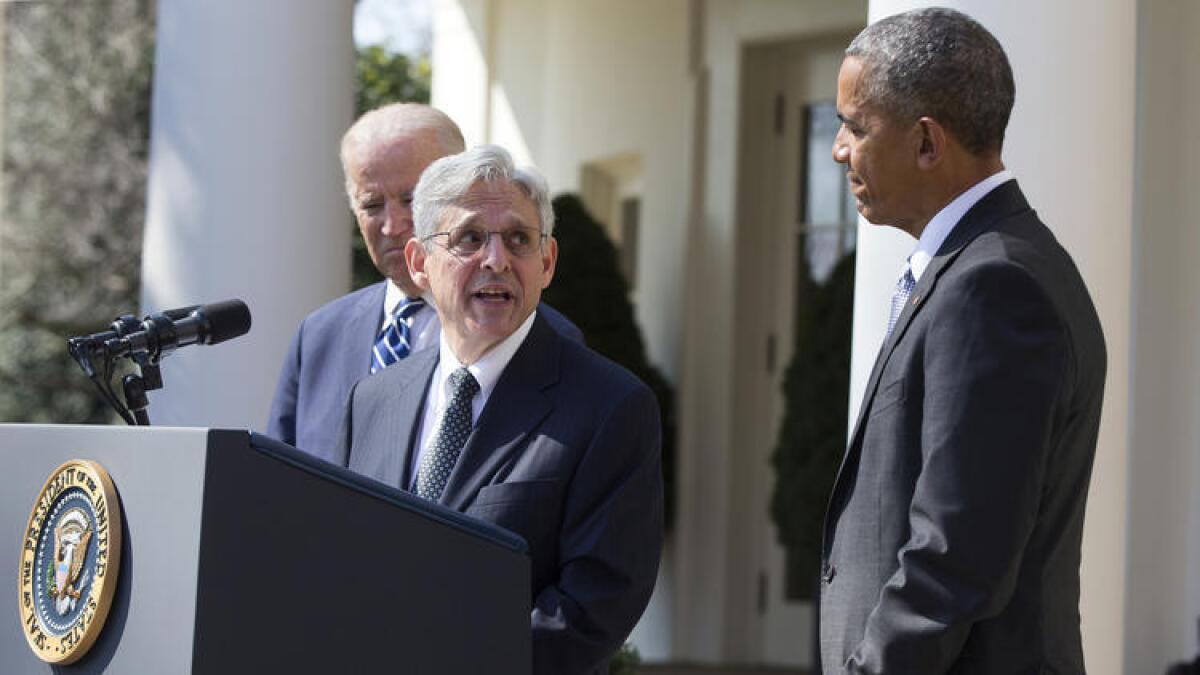Opinion: Like Roberts, Judge Garland is a regular guy. Really

Supreme Court nominee Merrick Garland is flanked at the White House by Vice President Joe Biden and President Obama.
Merrick Garland, President Obama’s latest nominee for the Supreme Court, is the chief judge of what is often described as the second most important court in the land, with almost two decades of experience on the bench. He’s a graduate of Harvard Law School, a onetime Supreme Court clerk, a former Justice Department official who supervised the prosecution of the Oklahoma City bombing case and, for good measure, he has a testimonial to his brilliance from his former colleague Chief Justice John G. Roberts Jr.
But if those credentials don’t convince you that he’s qualified for the court, don’t worry. He’s also a REGULAR GUY.
Introducing Garland in the Rose Garden on Wednesday, Obama noted that “he put himself through Harvard Law School by working as a tutor, by stocking shoes in a shoe store, and, in what is always a painful moment for any young man, by selling his comic book collection.”
OK, now you must agree that he’s qualified!
Obama isn’t unique in packaging a highly educated — let’s say it, elite — nominee as a working stiff. Here’s President George W. Bush in 2005 introducing Roberts:
“In high school, he captained his football team, and he worked summers in a steel mill to help pay his way through college.” (Bush didn’t add that Roberts’ father had been the general manager of Bethlehem Steel plant. Garland’s father, by the way, was an advertising executive.)
Only after Bush mentioned Roberts’ hard labor as a college student did he get around to the detail that his nominee had argued 39 cases before the Supreme Court.
Why this unconvincing attempt to depict high-achieving, prosperous, well-educated lawyers as ordinary folks?
It’s easier to see why Obama might consider such populist bona fides important: He likes to portray the role of a Supreme Court justice in broad, humanistic terms. (Remember empathy?) He emphasized that Garland, while supervising the Oklahoma City case, “carried with him in his briefcase the program from the memorial service with each of the victims’ names inside — a constant, searing reminder of why he had to succeed.”
But Bush’s reference to Roberts’ steel-mill summers is a reminder that this impulse is bipartisan.
Of course, the cult of the common man is a familiar feature of American democracy. (Did you know that John Kasich’s father was a mailman?) But it’s one thing for would-be presidents or senators to try to demonstrate that they’re regular guys. Elected officials are supposed to represent “the people” — in the sense of both acting on their behalf and channeling their experiences.
But the Supreme Court isn’t a representative body. And, while one can argue that its membership could benefit from some diversity of early life experiences, the fact that justices are very smart and very accomplished lawyers means that by definition, they’re not like the rest of us.
I think Americans realize this, and that mine weren’t the only eyes that rolled when Obama talked about Garland’s painful decision to sell his comic-book stash.
Follow Michael McGough on Twitter @MichaelMcGough3
More to Read
A cure for the common opinion
Get thought-provoking perspectives with our weekly newsletter.
You may occasionally receive promotional content from the Los Angeles Times.











